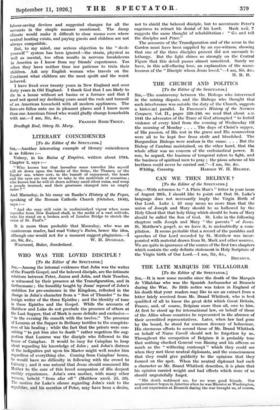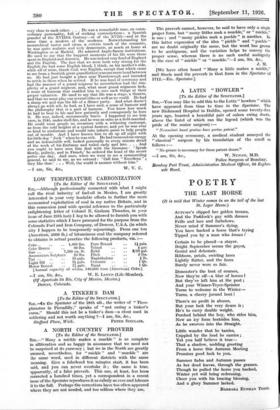THE LATE MARQUIS DE VILLALOBAR
[To the Editor of the SPECTATOR.] is now some months since the death of the Marquis de Vilialobar who was the Spanish Ambassador at Brussels during the War. So little notice was taken in England of his death that your readers may like to see an extract from a letter lately received from Mr. Brand Whitlock, who is best qualified of all to know the great debt which Great Britain, France, and, of course, Belgium more than all, owe to him. At first he stood up for international law, on behalf of those of the Allies whose countries he represented in the absence of their accredited representatives. Later, when law had gone by the board, he stood for common decency of behaviour. His strenuous efforts to second those of Mr. Brand Whitlock on behalf of Nurse Cavell should not be forgotten by us. Throughout the occupation of Belgium it is probably true that nothing checked General von Bissing and his officers so much as the " withering contempt " which they could see 'when they met these neutral diplomats, and the consciousness that they could give publicity to the opinions that they formed on the spot. When the neutral diplomat had such a character as Mr. Brand Whitlock describes, it is plain that his opinion carried weight and had effects which none of us should ungratefully forget.
" His death saddened me, for we were good friends. Our acquaintance began in America when ho was Minister at Washington, and our experience at. Brussels during the war brought us, of course, very close to each other.. . . He was a remarkable man, an extra- ordinary personality, full of striking contradictions ; a Spanish grandee of the XVIIIth Century—or of the XVIth—and at the same time a modern of the moderns. Notwithstanding his monarchical tastes and ideas, a certain touch of the romantic, he was quite realistic and very democratic, as much at home at Washington as at Madrid. He admired Anglo-Saxon institutions. Ho used to say that the happiest moments of his life were those spent in England and America. He was indeed very fond of England and the English. The fact that we were both very strong for tho English (he had some English blood, I think, on his mother's side, while all of mine, thank God, was English, except that which came to me from a Scottish great-grandfather) was one more bond between us. He had just bought a place near Farnborough and intended to settle in there when he retired. If he was fond of ceremony and had the manner of a grand seigneur he nevertheless had the sim- plicity of a grand seigneur, and, what most grand seigneurs lack, a sense of humour that enabled him to rate such things at their proper valuation. Ho used to say that life was a stage, a theatre, and that we must play our several rSlea as well as we could. He had a sharp wit and was the life of a dinner party. And what doesn't always go with wit, ho had, as I have said, a sense of humour and the philosophy that is a part of humour. You know how much he had to bear in life and how patiently and courageously he bore It. He was, indeed, uncommonly brave. I happened to see him once, in 19}5, under shell fire, and he was as calm as a field-marshal. He could treat people on occasions with a withering contempt, as from the cold heights of a cynical hauteur, and yet he was ever so kind to misfortune and would take infinite pains to help people out of trouble. And I have known him to sit up all night with his little dog " Jock " when he was sick. He had tremendous energy and an indomitable will, looked personally to every minute detail of the work of his Embassy and toiled early and late. . . . And you ought to have seen him deal with the Germans • Speak slowly, politely, and in French,' he ordered the head of the secret police one day. And once, when we went to see a commanding general, he said to me, as we entered : Call him " Excellenz " ; they like that.' . . Well, the world is meaner without him."







































 Previous page
Previous page